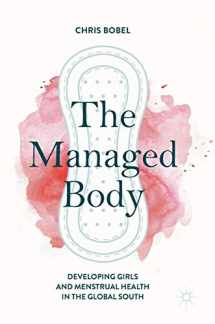
The Managed Body: Developing Girls and Menstrual Health in the Global South
ISBN-13:
9783319894133
ISBN-10:
3319894137
Edition:
1st ed. 2019
Author:
Chris Bobel
Publication date:
2018
Publisher:
Palgrave Macmillan
Format:
Hardcover
373 pages
Category:
Gender Studies
,
Social Sciences
FREE US shipping
Book details
ISBN-13:
9783319894133
ISBN-10:
3319894137
Edition:
1st ed. 2019
Author:
Chris Bobel
Publication date:
2018
Publisher:
Palgrave Macmillan
Format:
Hardcover
373 pages
Category:
Gender Studies
,
Social Sciences
Summary
The Managed Body: Developing Girls and Menstrual Health in the Global South (ISBN-13: 9783319894133 and ISBN-10: 3319894137), written by authors
Chris Bobel, was published by Palgrave Macmillan in 2018.
With an overall rating of 4.4 stars, it's a notable title among other
Gender Studies
(Social Sciences) books. You can easily purchase or rent The Managed Body: Developing Girls and Menstrual Health in the Global South (Hardcover) from BooksRun,
along with many other new and used
Gender Studies
books
and textbooks.
And, if you're looking to sell your copy, our current buyback offer is $1.75.
Description
The Managed Body productively complicates ‘menstrual hygiene management’ (MHM)―a growing social movement to support menstruating girls in the Global South. Bobel offers an invested critique of the complicated discourses of MHM including its conceptual and practical links with the Water, Sanitation and Hygiene (WASH) development sector, human rights and ‘the girling of development.’ Drawing on analysis of in-depth interviews, participant observations and the digital materials of NGOs and social businesses, Bobel shows how MHM frames problems and solutions to capture attention and direct resources to this highly-tabooed topic. She asserts that MHM organizations often inadvertently rely upon weak evidence and spectacularized representations to make the claim of a ‘hygienic crisis’ that authorizes rescue. And, she argues, the largely product-based solutions that follow fail to challenge the social construction of the menstrual body as dirty and in need of concealment. While cast as fundamental to preserving girls’ dignity, MHM prioritizes ‘technological fixes’ that teach girls to discipline their developing bodies vis a vis consumer culture, a move that actually accommodates more than it resists the core problem of menstrual stigma.


We would LOVE it if you could help us and other readers by reviewing the book
Book review

Congratulations! We have received your book review.
{user}
{createdAt}
by {truncated_author}


